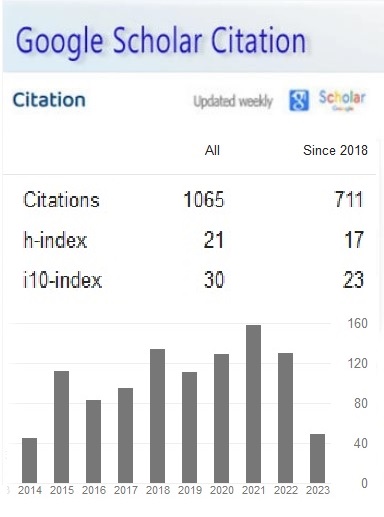WebGL Rendering: Using Physical-Based Materials and Lighting to Create a Virtual Environment on the Web
Keywords:
Abstract
The environment of the World Wide Web is increasingly becoming more significant for incorporating three-dimensional content. Since the introduction of WebGL to the present day, many solutions (including libraries, middleware, and apps) have been developed, encouraging the development of 3D data as a kind of practical online media. Because of the rapid advancement of 3D technology and other associated web-based resources, it isn't easy to recognize and correctly comprehend the most recent trends and open questions in the industry. This survey analyzes the current state of the art of 3D web publishing, reviews the possibilities provided by the primary current approaches, and categorizes the features supported by existing solutions, and cross-maps these with the requirements of a few main application domains. The survey begins with these premises and examines the state of the art of 3D web publishing. The findings of this investigation help define the technical features required to construct an efficient and effective 3D data presentation while considering the various application settings.
References
Amin, R., & Mandapuram, M. (2021). CMS - Intelligent Machine Translation with Adaptation and AI. ABC Journal of Advanced Research, 10(2), 199-206. https://doi.org/10.18034/abcjar.v10i2.693
Ballamudi, V. K. R. (2016). Utilization of Machine Learning in a Responsible Manner in the Healthcare Sector. Malaysian Journal of Medical and Biological Research, 3(2), 117-122. https://mjmbr.my/index.php/mjmbr/article/view/677
Ballamudi, V. K. R. (2019a). Artificial Intelligence: Implication on Management. Global Disclosure of Economics and Business, 8(2), 105-118. https://doi.org/10.18034/gdeb.v8i2.540
Ballamudi, V. K. R. (2019b). Road Accident Analysis and Prediction using Machine Learning Algorithmic Approaches. Asian Journal of Humanity, Art and Literature, 6(2), 185-192. https://doi.org/10.18034/ajhal.v6i2.529
Ballamudi, V. K. R. (2019c). Hybrid Automata: An Algorithmic Approach Behavioral Hybrid Systems. Asia Pacific Journal of Energy and Environment, 6(2), 83-90. https://doi.org/10.18034/apjee.v6i2.541
Ballamudi, V. K. R. (2020). Militarization of Space. Asian Journal of Applied Science and Engineering, 9(1), 169–178. https://doi.org/10.18034/ajase.v9i1.38
Ballamudi, V. K. R., & Desamsetti, H. (2017). Security and Privacy in Cloud Computing: Challenges and Opportunities. American Journal of Trade and Policy, 4(3), 129–136. https://doi.org/10.18034/ajtp.v4i3.667
Ballamudi, V. K. R., Lal, K., Desamsetti, H., & Dekkati, S. (2021). Getting Started Modern Web Development with Next.js: An Indispensable React Framework. Digitalization & Sustainability Review, 1(1), 1–11. https://upright.pub/index.php/dsr/article/view/83
Bodepudi, A., Reddy, M., Gutlapalli, S. S., & Mandapuram, M. (2019). Voice Recognition Systems in the Cloud Networks: Has It Reached Its Full Potential?. Asian Journal of Applied Science and Engineering, 8(1), 51–60. https://doi.org/10.18034/ajase.v8i1.12
Bodepudi, A., Reddy, M., Gutlapalli, S. S., & Mandapuram, M. (2021). Algorithm Policy for the Authentication of Indirect Fingerprints Used in Cloud Computing. American Journal of Trade and Policy, 8(3), 231–238. https://doi.org/10.18034/ajtp.v8i3.651
Chen, S., Thaduri, U. R., & Ballamudi, V. K. R. (2019). Front-End Development in React: An Overview. Engineering International, 7(2), 117–126. https://doi.org/10.18034/ei.v7i2.662
Chistyakov, A., Soto, M. T., Martí, E., Carrabina, J. (2016). An HTML Tool for Production of Interactive Stereoscopic Compositions. Journal of Medical Systems, 40(12), 1-9. https://doi.org/10.1007/s10916-016-0616-0
Christen, M., Nebiker, S. (2015). Visualisation of Complex 3D City Models on Mobile Web browsers Using Cloud-Based Image Provisioning. ISPRS Annals of the Photogrammetry, Remote Sensing and Spatial Information Sciences, II-3/W5, 517-522. https://doi.org/10.5194/isprsannals-II-3-W5-517-2015
Dekkati, S. (2020). Blender and Unreal Engine Character Design and Behavior Programming for 3D Games. ABC Journal of Advanced Research, 9(2), 115-126. https://doi.org/10.18034/abcjar.v9i2.704
Dekkati, S. (2021). Python Programming Language for Data-Driven Web Applications. International Journal of Reciprocal Symmetry and Theoretical Physics, 8, 1–10. https://upright.pub/index.php/ijrstp/article/view/90
Dekkati, S., & Thaduri, U. R. (2017). Innovative Method for the Prediction of Software Defects Based on Class Imbalance Datasets. Technology & Management Review, 2, 1–5. https://upright.pub/index.php/tmr/article/view/78
Dekkati, S., Lal, K., & Desamsetti, H. (2019). React Native for Android: Cross-Platform Mobile Application Development. Global Disclosure of Economics and Business, 8(2), 153-164. https://doi.org/10.18034/gdeb.v8i2.696
Dekkati, S., Thaduri, U. R., & Lal, K. (2016). Business Value of Digitization: Curse or Blessing?. Global Disclosure of Economics and Business, 5(2), 133-138. https://doi.org/10.18034/gdeb.v5i2.702
Demin, A., Zhang, T. R., Geng, H. S., Li, X., Wang, W. S. (2013). Research on Motion Simulation for Robot Based on WebGL. Applied Mechanics and Materials, 341-342, 704. https://doi.org/10.4028/www.scientific.net/AMM.341-342.704
Deming, C., Dekkati, S., & Desamsetti, H. (2018). Exploratory Data Analysis and Visualization for Business Analytics. Asian Journal of Applied Science and Engineering, 7(1), 93–100. https://doi.org/10.18034/ajase.v7i1.53
Desamsetti, H. (2016a). A Fused Homomorphic Encryption Technique to Increase Secure Data Storage in Cloud Based Systems. The International Journal of Science & Technoledge, 4(10), 151-155.
Desamsetti, H. (2016b). Issues with the Cloud Computing Technology. International Research Journal of Engineering and Technology (IRJET), 3(5), 321-323.
Desamsetti, H. (2018). Internet of Things (IoT) Technology for Use as Part of the Development of Smart Home Systems. International Journal of Reciprocal Symmetry and Theoretical Physics, 5, 14–21. https://upright.pub/index.php/ijrstp/article/view/89
Desamsetti, H. (2020). Relational Database Management Systems in Business and Organization Strategies. Global Disclosure of Economics and Business, 9(2), 151-162. https://doi.org/10.18034/gdeb.v9i2.700
Desamsetti, H. (2021). Crime and Cybersecurity as Advanced Persistent Threat: A Constant E-Commerce Challenges. American Journal of Trade and Policy, 8(3), 239–246. https://doi.org/10.18034/ajtp.v8i3.666
Desamsetti, H., & Lal, K. (2019). Being a Realistic Master: Creating Props and Environments Design for AAA Games. Asian Journal of Humanity, Art and Literature, 6(2), 193-202. https://doi.org/10.18034/ajhal.v6i2.701
Desamsetti, H., & Mandapuram, M. (2017). A Review of Meta-Model Designed for the Model-Based Testing Technique. Engineering International, 5(2), 107–110. https://doi.org/10.18034/ei.v5i2.661
Gutlapalli, S. S. (2016a). An Examination of Nanotechnology’s Role as an Integral Part of Electronics. ABC Research Alert, 4(3), 21–27. https://doi.org/10.18034/ra.v4i3.651
Gutlapalli, S. S. (2016b). Commercial Applications of Blockchain and Distributed Ledger Technology. Engineering International, 4(2), 89–94. https://doi.org/10.18034/ei.v4i2.653
Gutlapalli, S. S. (2017a). Analysis of Multimodal Data Using Deep Learning and Machine Learning. Asian Journal of Humanity, Art and Literature, 4(2), 171–176. https://doi.org/10.18034/ajhal.v4i2.658
Gutlapalli, S. S. (2017b). The Role of Deep Learning in the Fourth Industrial Revolution: A Digital Transformation Approach. Asian Accounting and Auditing Advancement, 8(1), 52–56. https://4ajournal.com/article/view/77
Gutlapalli, S. S. (2017c). An Early Cautionary Scan of the Security Risks of the Internet of Things. Asian Journal of Applied Science and Engineering, 6, 163–168. Retrieved from https://ajase.net/article/view/14
Gutlapalli, S. S., Mandapuram, M., Reddy, M., & Bodepudi, A. (2019). Evaluation of Hospital Information Systems (HIS) in terms of their Suitability for Tasks. Malaysian Journal of Medical and Biological Research, 6(2), 143–150. https://mjmbr.my/index.php/mjmbr/article/view/661
Hosen, M. S., & Gutlapalli, S. S. (2021). A Study of Innovative Class Imbalance Dataset Software Defect Prediction Methods. Asian Journal of Applied Science and Engineering, 10(1), 52–55. https://doi.org/10.18034/ajase.v10i1.52
Hosen, M. S., Thaduri, U. R., Ballamudi, V. K. R., & Lal, K. (2021). Photo-Realistic 3D Models and Animations for Video Games and Films. Engineering International, 9(2), 153–164. https://doi.org/10.18034/ei.v9i2.668
Kang, S., Lee, J. (2017). Developing a Tile-Based Rendering Method to Improve Rendering Speed of 3D Geospatial Data with HTML5 and WebGL. Journal of Sensors, 2017, https://doi.org/10.1155/2017/9781307
Koehler, S., Desamsetti, H., Ballamudi, V. K. R., & Dekkati, S. (2020). Real World Applications of Cloud Computing: Architecture, Reasons for Using, and Challenges. Asia Pacific Journal of Energy and Environment, 7(2), 93-102. https://doi.org/10.18034/apjee.v7i2.698
Lal, K. (2015). How Does Cloud Infrastructure Work?. Asia Pacific Journal of Energy and Environment, 2(2), 61-64. https://doi.org/10.18034/apjee.v2i2.697
Lal, K. (2016). Impact of Multi-Cloud Infrastructure on Business Organizations to Use Cloud Platforms to Fulfill Their Cloud Needs. American Journal of Trade and Policy, 3(3), 121–126. https://doi.org/10.18034/ajtp.v3i3.663
Lal, K., & Ballamudi, V. K. R. (2017). Unlock Data’s Full Potential with Segment: A Cloud Data Integration Approach. Technology & Management Review, 2(1), 6–12. https://upright.pub/index.php/tmr/article/view/80
Lal, K., Ballamudi, V. K. R., & Thaduri, U. R. (2018). Exploiting the Potential of Artificial Intelligence in Decision Support Systems. ABC Journal of Advanced Research, 7(2), 131-138. https://doi.org/10.18034/abcjar.v7i2.695
Mandapuram, M. (2016). Applications of Blockchain and Distributed Ledger Technology (DLT) in Commercial Settings. Asian Accounting and Auditing Advancement, 7(1), 50–57. https://4ajournal.com/article/view/76
Mandapuram, M. (2017a). Application of Artificial Intelligence in Contemporary Business: An Analysis for Content Management System Optimization. Asian Business Review, 7(3), 117–122. https://doi.org/10.18034/abr.v7i3.650
Mandapuram, M. (2017b). Security Risk Analysis of the Internet of Things: An Early Cautionary Scan. ABC Research Alert, 5(3), 49–55. https://doi.org/10.18034/ra.v5i3.650
Mandapuram, M., & Hosen, M. F. (2018). The Object-Oriented Database Management System versus the Relational Database Management System: A Comparison. Global Disclosure of Economics and Business, 7(2), 89–96. https://doi.org/10.18034/gdeb.v7i2.657
Mandapuram, M., Gutlapalli, S. S., Bodepudi, A., & Reddy, M. (2018). Investigating the Prospects of Generative Artificial Intelligence. Asian Journal of Humanity, Art and Literature, 5(2), 167–174. https://doi.org/10.18034/ajhal.v5i2.659
Mandapuram, M., Gutlapalli, S. S., Reddy, M., Bodepudi, A. (2020). Application of Artificial Intelligence (AI) Technologies to Accelerate Market Segmentation. Global Disclosure of Economics and Business 9(2), 141–150. https://doi.org/10.18034/gdeb.v9i2.662
Reddy, M., Bodepudi, A., Mandapuram, M., & Gutlapalli, S. S. (2020). Face Detection and Recognition Techniques through the Cloud Network: An Exploratory Study. ABC Journal of Advanced Research, 9(2), 103–114. https://doi.org/10.18034/abcjar.v9i2.660
Sawicki, B., Chaber, B. (2013). Efficient Visualization of 3D Models by Web Browser. Computing. Archives for Informatics and Numerical Computation, suppl. Supplement, 95, 661-673. https://doi.org/10.1007/s00607-012-0275-z
Shi, X., Fu, J., Jin, C. (2017). Development of 3D Browsing and Interactive Web System. IOP Conference Series. Materials Science and Engineering, 242(1). https://doi.org/10.1088/1757-899X/242/1/012113
Sun, F., Zhang, Z., Liao, D., Chen, T., Zhou, J. (2015). A Lightweight and Cross-Platform Web3D System for Casting Process Based on Virtual Reality Technology Using WebGL. The International Journal of Advanced Manufacturing Technology, 80(5-8), 801-816. https://doi.org/10.1007/s00170-015-7050-1
Thaduri, U. R. (2017). Business Security Threat Overview Using IT and Business Intelligence. Global Disclosure of Economics and Business, 6(2), 123-132. https://doi.org/10.18034/gdeb.v6i2.703
Thaduri, U. R. (2018). Business Insights of Artificial Intelligence and the Future of Humans. American Journal of Trade and Policy, 5(3), 143–150. https://doi.org/10.18034/ajtp.v5i3.669
Thaduri, U. R. (2019). Android & iOS Health Apps for Track Physical Activity and Healthcare. Malaysian Journal of Medical and Biological Research, 6(2), 151-156. https://mjmbr.my/index.php/mjmbr/article/view/678
Thaduri, U. R. (2020). Decision Intelligence in Business: A Tool for Quick and Accurate Marketing Analysis. Asian Business Review, 10(3), 193–200. https://doi.org/10.18034/abr.v10i3.670
Thaduri, U. R. (2021). Virtual Reality & Artificial Intelligence in Real Estate Business: A Tool for Effective Marketing Campaigns. Asian Journal of Applied Science and Engineering, 10(1), 56–65. https://doi.org/10.18034/ajase.v10i1.54
Thaduri, U. R., & Lal, K. (2020). Making a Dynamic Website: A Simple JavaScript Guide. Technology & Management Review, 5, 15–27. https://upright.pub/index.php/tmr/article/view/81
Thaduri, U. R., Ballamudi, V. K. R., Dekkati, S., & Mandapuram, M. (2016). Making the Cloud Adoption Decisions: Gaining Advantages from Taking an Integrated Approach. International Journal of Reciprocal Symmetry and Theoretical Physics, 3, 11–16. https://upright.pub/index.php/ijrstp/article/view/77
Thodupunori, S. R., & Gutlapalli, S. S. (2018). Overview of LeOra Software: A Statistical Tool for Decision Makers. Technology & Management Review, 3(1), 7–11.
Voutilainen, J-P., Mattila, A-L., Mikkonen, T. (2014). Lively3D: Building a 3D Desktop Environment as a Single Page Application. Acta Cybernetica, 21(3), 291-306. https://doi.org/10.14232/actacyb.21.3.2014.2
Xu, Z., Zhang, Y., Xu, X. (2016). 3D Visualization for Building Information Models Based Upon IFC and WebGL Integration. Multimedia Tools and Applications, 75(24), 17421-17441. https://doi.org/10.1007/s11042-016-4104-9
Ye, M., Wei, S., Zhang, D. (2016). An Approach of Web-based Point Cloud Visualization without Plugin. IOP Conference Series. Earth and Environmental Science, 46(1). https://doi.org/10.1088/1755-1315/46/1/012011
Published
How to Cite
Issue
Section
License
Copyright (c) 2022 Asian Journal of Applied Science and Engineering

This work is licensed under a Creative Commons Attribution-NonCommercial 4.0 International License.








